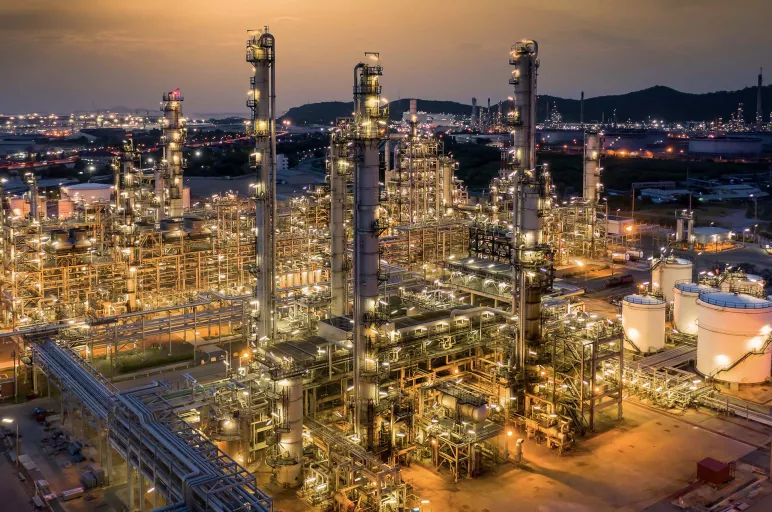
Refinery Procurement: Capturing Value in Complex Ecosystems of Oil Refineries
- Leveraging scale and standardization helps enterprises consolidate volumes and reduce custom designs to lower costs through increased bargaining power and simplicity.
- Enterprises can enable data-driven decisions by incorporating advanced analytics across spend tiers and operational inputs, thereby optimizing planning and inventory.
- Enterprises can transform relationships by rationalizing suppliers, building collaboration, and using a centralized structure, helping them augment procurement's strategic impact.
November 16, 2023 | Procurement Strategy 3 minutes read
Procurement has a critical role to play in oil refineries in managing costs and reliability. The sheer scale and varied nature of raw materials, equipment, MRO supplies and services in the oil and gas industry make refinery procurement a complex task. The goal is to centralize procurement so that businesses can achieve a significant bottom line.
This blog objectively examines key considerations and best practices for refinery procurement.
Challenges in Refinery Procurement
Refinery procurement presents unique challenges stemming from input variability, output volatility, equipment criticality, process interdependency, and extraction from remote locations. It requires meticulous inventory management to mitigate high costs and to address the need for flexibility in processing diverse crude feedstock. Precise adherence to specifications is essential for integrated production processes, more so as remote locations of many facilities contribute to elevated logistics costs. Balancing these variables makes demand forecasting and supply management a perpetual exercise in cost control and reliability.
Let's take a look at some of the challenges or variables in refinery procurement:
Input Variability
Wide range of crude feedstock properties demands flexibility in processing, directly affecting equipment and chemical needs.
Output Volatility
Changes in product demand and prices alter operating requirements and margins.
Equipment Criticality
Unplanned downtime has very high costs, requiring MRO inventory buffers.
Process Interdependency
Materials must conform to specifications for integrated production processes.
Remote Locations
Distance from vendors and hazards add logistics costs.
Opportunities for Savings and Efficiency in Refinery Procurement
The full potential of refinery procurement goes beyond navigating challenges; it involves seizing strategic opportunities for savings. It requires enterprises to explore the key avenues for optimization, ranging from handling variability in crude composition to leveraging scale for bulk discounts. There are many areas that have a significant potential to lower procurement costs, including:
Optimizing Variability
Optimize handling of varying crude composition.
Leveraging Scale
Consolidate volumes across sites for bulk discounts.
Standardization
Reduce customization to cut expenses on unique designs.
Data-driven Inventory
Apply analytics to right-size MRO stock levels.
Contract Compliance
Enforce negotiated terms and pricing discipline.
Vendor Consolidation
Simplify management through supply base rationalization.
Capturing the aforementioned opportunities involves overcoming stakeholder resistance, lack of reliable data, and organizational silos. A strategic roadmap can however help enterprises sail through the transformation.
Steps to Maximize Value from Refinery Procurement
The following steps when executed effectively can transform procurement to enhance refinery margins, resilience and operational efficiency.
Map Detailed Category Spend
Collect, cleanse and analyze expenditure data across the supply chain tiers. Identify savings potential.
Develop Category Strategies
Create detailed plans for managing cost drivers tailored to each spend area and market dynamics.
Centralize Procurement Structure
Consolidate teams and establish an organizational Center of Excellence with resources, tools, and training.
Implement eProcurement Technology
Deploy automation for sourcing, contract management, purchasing and payments.
Optimize Supplier Relationships
Rationalize suppliers and promote collaboration through performance reviews, incentives and long-term agreements.
Build Analytics Capacity
Develop reporting for actionable insights and predictive modeling to guide decisions.
Foster Cross-Functional Engagement
Work with stakeholders in planning, freight, operations and maintenance to shape outcomes.
Overcoming Implementation Barriers
Realizing the full benefits of strategic procurement in the oil and gas industry requires overcoming change management challenges. Refinery procurement encounters several barriers such as resistance to standardization, compliance concerns, reluctance to centralize sourcing, and limited spend data. Overcoming these barriers requires the organization to implement strategic initiatives, including gaining leadership support, piloting changes, offering extensive training, and utilizing analytics for decision support. By adopting this comprehensive approach, organizations not only address specific challenges but also cultivate a culture of adaptability and efficiency within refinery procurement processes, ensuring sustained success in a dynamic industry landscape.
Conclusion
Refinery procurement in the oil and gas industry holds significant potential for reducing costs and driving margin growth. A dedicated effort combining detailed spend analysis, cross-functional engagement, optimized supplier networks, technology enablement and robust analytics is needed to transform performance. With concerted leadership commitment and change management, refineries can establish strategic, value-creating procurement capabilities in line with top competitors. The journey requires patience, but the long-term rewards are substantial.



